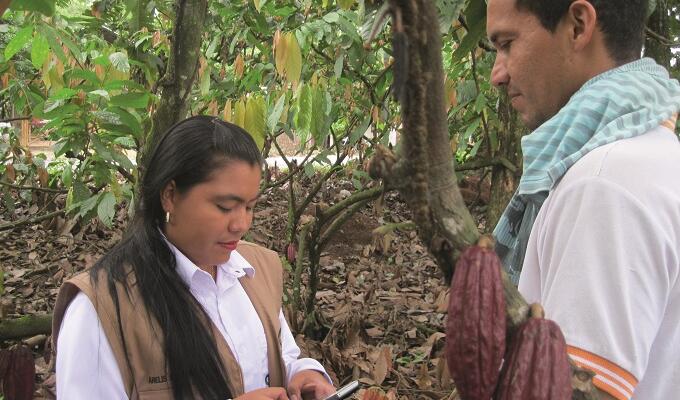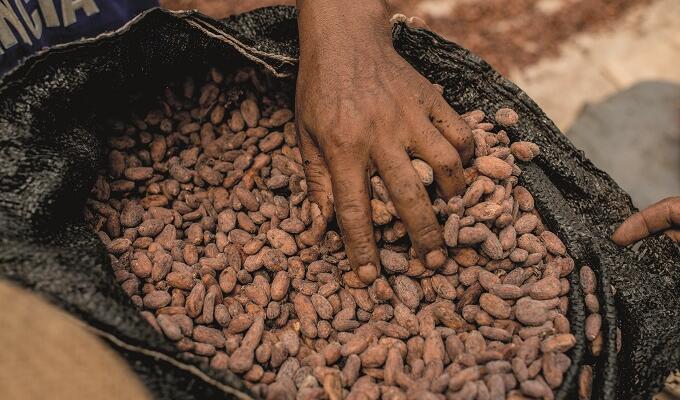


Historias
Colombian cocoa producers use sustainability guidelines to earn price premiums (en)
26 junio 2018
The challenge
Consumers around the world increasingly want to know where the food they eat and the products they use come from and how they were made. One consequence has been a proliferation of public and private standards, codes of conduct and other sustainability initiatives seeking to assure consumers their purchases respond to priorities ranging from organic production to rainforest protection or decent wages.
While producers can obtain lucrative price premiums by meeting these sustainability standards, doing so is not straightforward. Beyond the expenses related to complying with the often-exacting demands of a given initiative, there are costs associated with audits to prove compliance as well as receiving the formal certification that opens the door to niche markets. Even finding out which standards matter in a given market can be complicated.
In Colombia, demand for sustainably produced cocoa presents opportunities for farmers. However, producers have had mixed experiences with sustainability certification. The requirements of some certification schemes are difficult to implement, creating confusion for producers. In other cases, farmers’ cooperatives did not obtain the financial returns they expected on their investments, in part because they started the certification process without lining up prospective buyers.
The response
ITC, together with the Colombia office of Swisscontact, a Swiss non-profit foundation that promotes private sector development, developed a customized online tool to help cocoa producers understand and comply with international sustainability standards, as well as to connect to potential buyers. The tool, called Basic Guidelines for Sustainable Cocoa (LBCS, for the Spanish acronym), is based on ITC’s Sustainability Map, which aggregates information on hundreds of sustainability standards and codes of conduct for users to access.
The LBCS guidelines enable producers and their cooperatives to understand the various criteria sought by international sustainability certifications and conduct self-assessments that provide an initial diagnostic on practices they need to upgrade before seeking formal certification.
Because connections to buyers willing to pay a premium for sustainable cocoa are crucial for producers to realize a return on their investments in being certified, users of the LBCS tool are able to connect to prospective international buyers via the ITC Sustainability Map platform. In addition, the project supported cocoa producers to participate in key international trade fairs, such as the Salon du Chocolat 2017 in Paris.
This work sprang from an early-2017 agreement by ITC, Swisscontact Colombia and the Red Cacaotera, a Colombian network of cocoa producers, to promote the LBCS guidelines among organizations of cocoa producers with the aim to implement sustainable production practices while improving access to international markets. This built on earlier work with other farmers’ groups in the country.
The results
Technicians from three cocoa organizations developed diagnostic reports for 600 farmers, a third of them women, whose work supports the livelihoods of around 1,600 people. Users say the LBCS system has helped them make better use of resources by enabling them to make a realistic assessment of their capabilities.
‘It also shows us what we can really achieve,’ said Luis Martinez of the cooperative Corpoteva. ‘What sense would it have to engage in an organic certification if we see we are far from obtaining it? After self-assessment, we saw it was more realistic to look for a fair trade certification.’
The Salon du Chocolat in Paris and other networking opportunities led to $175,000 worth of sales for producers affiliated with the Red Cacaotera to buyers in Belgium, the Netherlands, Switzerland and the United Kingdom. An additional $200,000 of deals are expected to mature. Several chocolate companies in Europe, the United States and Colombia are now aware of the LBCS tool and are interested in buying from cooperatives that have been using the system. Similar work in the past has paved the way for international recognition and sharp increases in prices received by producers. Producers affiliated with the Alianza Exportadora de Tumaco in the country’s southwest have more than doubled their sale prices since winning an award for cocoa quality at the Salon du Chocolat in 2015.
The LBCS diagnostics helped them regain organic and fair trade certifications they had lost due to inconsistent implementation of sustainability requirements.
The future
In 2018 ITC, Swisscontact Colombia and Red Cacaotera plan work with organizations representing around 1,600 farmers and their families in the departments of Bolivar, Cesar and Magdalena to implement the LBCS guidelines and improve cocoa quality and productivity. The goal is for at least 25 of the network’s 54 organizations to use the LBCS tool to help their members comply with basic sustainability guidelines and gain access to international markets.
Consumers around the world increasingly want to know where the food they eat and the products they use come from and how they were made. One consequence has been a proliferation of public and private standards, codes of conduct and other sustainability initiatives seeking to assure consumers their purchases respond to priorities ranging from organic production to rainforest protection or decent wages.
While producers can obtain lucrative price premiums by meeting these sustainability standards, doing so is not straightforward. Beyond the expenses related to complying with the often-exacting demands of a given initiative, there are costs associated with audits to prove compliance as well as receiving the formal certification that opens the door to niche markets. Even finding out which standards matter in a given market can be complicated.
In Colombia, demand for sustainably produced cocoa presents opportunities for farmers. However, producers have had mixed experiences with sustainability certification. The requirements of some certification schemes are difficult to implement, creating confusion for producers. In other cases, farmers’ cooperatives did not obtain the financial returns they expected on their investments, in part because they started the certification process without lining up prospective buyers.
The response
ITC, together with the Colombia office of Swisscontact, a Swiss non-profit foundation that promotes private sector development, developed a customized online tool to help cocoa producers understand and comply with international sustainability standards, as well as to connect to potential buyers. The tool, called Basic Guidelines for Sustainable Cocoa (LBCS, for the Spanish acronym), is based on ITC’s Sustainability Map, which aggregates information on hundreds of sustainability standards and codes of conduct for users to access.
The LBCS guidelines enable producers and their cooperatives to understand the various criteria sought by international sustainability certifications and conduct self-assessments that provide an initial diagnostic on practices they need to upgrade before seeking formal certification.
Because connections to buyers willing to pay a premium for sustainable cocoa are crucial for producers to realize a return on their investments in being certified, users of the LBCS tool are able to connect to prospective international buyers via the ITC Sustainability Map platform. In addition, the project supported cocoa producers to participate in key international trade fairs, such as the Salon du Chocolat 2017 in Paris.
This work sprang from an early-2017 agreement by ITC, Swisscontact Colombia and the Red Cacaotera, a Colombian network of cocoa producers, to promote the LBCS guidelines among organizations of cocoa producers with the aim to implement sustainable production practices while improving access to international markets. This built on earlier work with other farmers’ groups in the country.
The results
Technicians from three cocoa organizations developed diagnostic reports for 600 farmers, a third of them women, whose work supports the livelihoods of around 1,600 people. Users say the LBCS system has helped them make better use of resources by enabling them to make a realistic assessment of their capabilities.
‘It also shows us what we can really achieve,’ said Luis Martinez of the cooperative Corpoteva. ‘What sense would it have to engage in an organic certification if we see we are far from obtaining it? After self-assessment, we saw it was more realistic to look for a fair trade certification.’
The Salon du Chocolat in Paris and other networking opportunities led to $175,000 worth of sales for producers affiliated with the Red Cacaotera to buyers in Belgium, the Netherlands, Switzerland and the United Kingdom. An additional $200,000 of deals are expected to mature. Several chocolate companies in Europe, the United States and Colombia are now aware of the LBCS tool and are interested in buying from cooperatives that have been using the system. Similar work in the past has paved the way for international recognition and sharp increases in prices received by producers. Producers affiliated with the Alianza Exportadora de Tumaco in the country’s southwest have more than doubled their sale prices since winning an award for cocoa quality at the Salon du Chocolat in 2015.
The LBCS diagnostics helped them regain organic and fair trade certifications they had lost due to inconsistent implementation of sustainability requirements.
The future
In 2018 ITC, Swisscontact Colombia and Red Cacaotera plan work with organizations representing around 1,600 farmers and their families in the departments of Bolivar, Cesar and Magdalena to implement the LBCS guidelines and improve cocoa quality and productivity. The goal is for at least 25 of the network’s 54 organizations to use the LBCS tool to help their members comply with basic sustainability guidelines and gain access to international markets.




